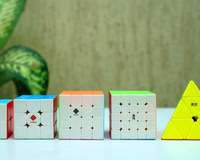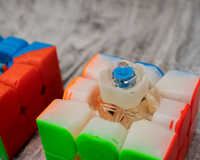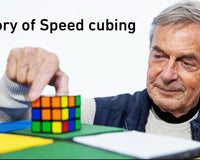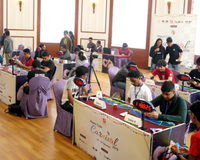Introduction
Are you considering introducing your child to the world of Rubik's Cube?
Perhaps you're wondering if there's an ideal age to begin this challenging yet rewarding puzzle-solving journey.
As a parent, you want to provide enriching activities that promote cognitive development and critical thinking skills. The Rubik's Cube offers just that, but when is the right time to start?
The truth is, there's no one-size-fits-all answer to this question. The ideal age for a child to start solving Rubik's Cube depends on various factors, including their individual interests, cognitive abilities, and level of patience. Let's delve deeper into this topic to help you make an informed decision.
1. Early Childhood (Ages 3-6)
For children in the early years of development, solving Rubik's Cube may seem daunting due to its complexity. At this age, kids are still refining their motor skills and may find it challenging to manipulate the cube's layers effectively.
However, introducing them to simpler puzzles or cube-related activities can lay the foundation for future interest in solving Rubik's Cube. For example, colorful cube-shaped toys or shape-sorting puzzles can help develop spatial awareness and problem-solving skills.

2. Middle Childhood (Ages 7-12)
This age range is an excellent time for children to start exploring Rubik's Cube seriously. Around the age of seven, many children have developed the fine motor skills and cognitive abilities necessary to grasp the concepts behind solving the cube. Moreover, they're often more patient and persistent, which are essential qualities for tackling this puzzle.
Introducing Rubik's Cube to kids in this age group can offer numerous benefits. Besides honing their problem-solving skills and logical reasoning, it can also foster perseverance and resilience. As they learn algorithms and strategies to solve the cube, they experience a sense of accomplishment that boosts their confidence and motivation.

3. Adolescence and Beyond
Teenagers and adults can start solving Rubik's Cube at any time. In fact, many people discover the cube later in life and become passionate enthusiasts. Adolescents, in particular, may appreciate the challenge and enjoy the mental stimulation it provides. Additionally, solving Rubik's Cube can serve as a relaxing hobby and a way to unwind from the stresses of school or work.
Regardless of age, the key to success in solving Rubik's Cube lies in patience, practice, and perseverance. With dedication and determination, anyone can master this iconic puzzle, regardless of when they start.

Founder's Cubing Journey
Our founders' enthusiasm for Rubik's Cube is ingrained from the top down. They discovered the cube during their college and became hooked on the challenge. What began as a hobby soon turned into a passion, driving them to become proficient solvers and enthusiasts of the cube. Their journey with the Rubik's Cube taught them valuable lessons in patience, perseverance, and problem-solving – qualities they believe are invaluable for anyone embarking on the cubing journey, regardless of age.
Conclusion
In conclusion, there isn't a definitive answer to the best age to start solving Rubik's Cube. Whether young or old, the journey offers valuable lessons in patience, perseverance, and problem-solving. Encourage curiosity and support exploration, as the Rubik's Cube adventure can be rewarding for all ages. So, grab a cube, dive in, and let the solving begin!
































